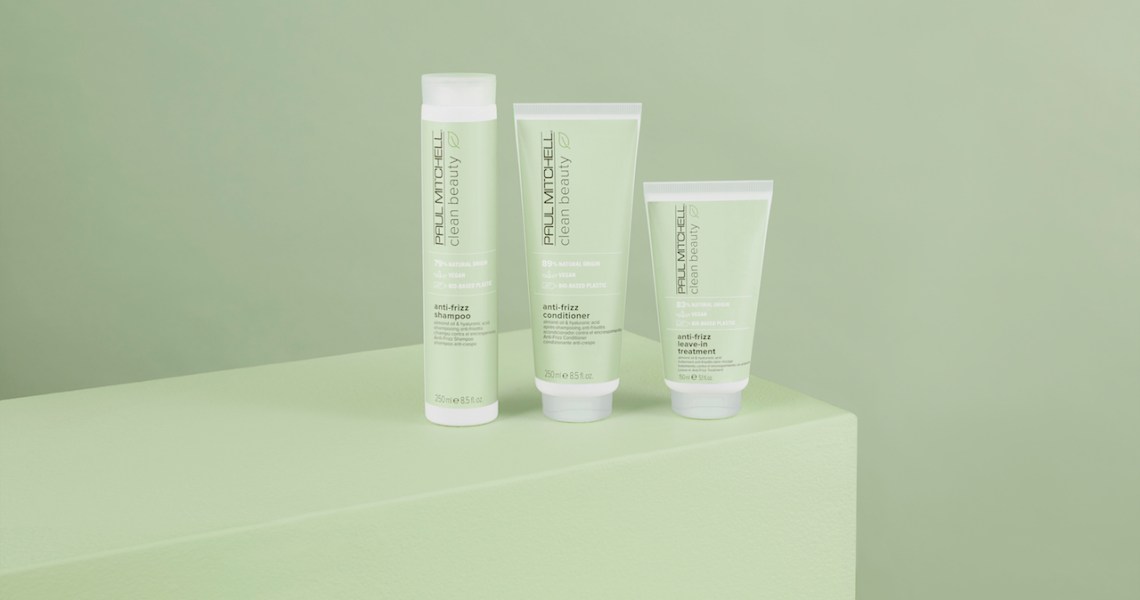As a growing number of hair-care giants adapt to the rise of clean beauty, Paul Mitchell is introducing its first attempt at a clean hair-care line.
Launching on Monday, the new Paul Mitchell Clean Beauty brand offers four categories for various use cases: everyday, anti-frizz, hydration and repair. With clean formulations and sustainable packaging, it is first being rolled out with the brand’s U.S. salon partners and Ulta. It will then sell on Amazon starting November 1. The collection will eventually be global, with Canada, Germany, the UK and Asia following between November and 2021. The new launch is the latest in a wave of heritage beauty giants developing clean products, and also shows the expansion of hair-care products in the clean category.
“Hair is very quickly catching up to skin, because people are just now starting to realize that your scalp is your skin too,” said Michaeline DeJoria, John Paul Mitchell Systems vice chairman.
The new line is formulated without parabens, sulfates, phthalates, DEA and mineral oils, and is cruelty-free and vegan with organic ingredients. Its 100% recyclable packaging is made up of 90% Brazilian sugarcane with a negative carbon footprint, according to the brand. DeJoria said the company is also thinking of making formula and sustainability changes to its other lines.
“We’re re-auditing every formulation, our manufacturing, our sustainability partners, the people that we do business with — the third party verifiers, shipping — everything,” she said. The brand also touts ingredients sourced from a biodynamic farm in Tuscany, creating what DeJoria calls a “farm-to-bottle” concept. “Nothing about it is corporate,” she said.
Because the niche supply chain is not without its challenges during a pandemic, the launch of Paul Mitchell Clean Beauty was pushed back several months from when it was originally planned, said DeJoria, citing both shipping and import delays.

Established beauty companies are increasingly turning to clean formulations or launching new lines with clean branding. G-beauty brand Babor, for example, launched its Cleanformance line in May, while Philosophy reformulated an existing cleanser in August, which is part of Coty’s larger clean bid.
Paul Mitchell is also the latest salon hair-care brand to get on board with clean beauty — L’Oréal’s Pureology relaunched in July with a reformulation, while Frédéric Fekkai and Henkel launched clean hair-care lines in January and April, respectively.
For Paul Mitchell, the new line is part of the brand’s overarching bid to appeal to younger shoppers. In 2016, it created a brand called Neon that targets teens. It features a shampoo, a conditioner and a leave-in product line.
“This generation — particularly Gen Z — is a very active and aware generation,” said DeJoria. “More and more, they are calling on companies to be more transparent, and they are very smart. They can see well beyond marketing, even better than their predecessors.”
DeJoria expects Ulta and Amazon to be the most popular sales channels for Paul Mitchell Clean Beauty. The brand is currently in discussions with Ulta Beauty about being added to the retailer’s newly unveiled Conscious Beauty lineup. Hair brands featured under the program right now include Fekkai and Innersense (which is listed as a part of Ulta’s Credo partnership).
Salon sales, meanwhile, “went down considerably” due to the pandemic. In the first six to eight weeks of lockdowns in the U.S., DeJoria said the brand saw its sales drop by a third. “We did see a dip, of course, when the salons closed. But we’ve been able to recoup a lot quicker than we thought we would, and we’ve really been cruising strong ever since,” she said. “We were very mindful to equip our partners, our salons, with stimulus packages when it all happened. We made a big investment into them reopening their businesses.”




